- Home
- Jr. Horatio Alger
Robert Coverdale's Struggle; Or, on the Wave of Success Page 4
Robert Coverdale's Struggle; Or, on the Wave of Success Read online
Page 4
CHAPTER IV
ROBERT'S PURCHASES
When Robert parted from Mr. Tudor he felt as if he had unexpectedlyfallen heir to a fortune. Two dollars is not a very large sum, but toRobert, nurtured amid privation, it assumed large proportions.
He began at once to consider what he could do with it, and it is to hiscredit that he thought rather of his aunt than himself.
He would buy a whole pound of tea, he decided, and a pound of sugar tomake it more palatable. This would last a considerable time and takeless than half his money. As to the disposal of the remainder, he wouldconsider how to expend that.
In a long, low building, with brooms, brushes and a variety ofnondescript articles displayed in the windows and outside, Abner Sandskept the village store.
It was a dark, gloomy place, crowded with articles for family use. Theproprietor enjoyed a monopoly of the village trade, and, in spite ofoccasional bad debts, did a snug business and was able every year tomake an addition to his store of savings in the county savings bank.
He was a cautious man, and, by being well acquainted with thecircumstances and habits of every man in the village, knew whom to trustand to whom to refuse credit. John Trafton belonged to the latterclass.
Mr. Sands knew, as everybody else knew, that all his money was investedin liquor and that the chance of paying a bill for articles needful forthe household was very small indeed.
When, therefore, Robert entered the store he took it for granted that hemeant to ask credit, and he was all ready for a refusal.
"What do you charge for your tea, Mr. Sands?" the boy asked.
"Different prices, according to quality," answered the storekeeper, notthinking it necessary to go into details.
"How much is the cheapest?"
"Fifty cents a pound."
"Do you call it a pretty good article?" continued our hero.
"Very fair; I use it in my own family," answered Abner, looking over hisspectacles at his young customer.
"I guess I'll take a pound," said Robert with the air of one who hadplenty of money.
"A pound?" ejaculated Abner Sands in surprise.
"Yes, sir."
A pound of tea for one in John Trafton's circumstances seemed to Mr.Sands an extraordinary order. Considering that it was probably to becharged, it seemed to the cautious trader an impudent attempt to imposeupon him, and he looked sternly at our young hero.
"We don't trust," he said coldly.
"I haven't asked you to trust me, Mr. Sands," said Robertindependently.
"You don't mean to say you're ready to pay for it cash down, do you?"asked Abner, his countenance expressing amazement.
"Yes, I do."
"Show me the money."
"I'll show you the money when I get my tea," said Robert, provoked atMr. Sands' resolute incredulity. "I've told you I will pay you before Ileave the store. If you don't want to sell your goods, say so!"
"Come, come! there ain't no use in gettin' angry," said the trader in aconciliatory tone. "Your trade's as good as anybody's if you've gotmoney to pay for the goods."
"I've already told you I have, Mr. Sands."
"All right, Robert. You shall have the tea."
He weighed out the tea and then asked:
"Is there anything more?"
"Yes, sir. How do you sell your sugar?"
"Brown sugar--eight cents."
"I guess that will do. I will take a pound of brown sugar."
"Your folks don't generally buy sugar. I didn't know you used it."
"We are going to use a pound," said Robert, who did not fancy thetrader's interference.
"Well, I'd jest as soon sell you a pound as anybody as long as you'vegot the money to pay for it."
Robert said nothing, although this remark was made in an interrogativetone, as if Mr. Sands still doubted whether our hero would be able topay for his purchases.
There was nothing to do, therefore, but to weigh out the sugar.
The two bundles lay on the counter, but Mr. Sands watched them as a catwatches a mouse, with a vague apprehension that our hero might seizethem and carry them off without payment.
But Robert was better prepared than he supposed.
From his vest pocket he drew the two-dollar bill, and, passing it acrossthe counter, he said:
"You may take your pay out of this."
Abner Sands took the bill and stared at it as if some mystery attachedto it. He scrutinized it carefully through his spectacles, as if therewas a possibility that it might be bad, but it had an unmistakablygenuine look.
"It seems to be good," he remarked cautiously.
"Of course it's good!" said Robert. "You don't take me for acounterfeiter, do you, Mr. Sands?"
"It's a good deal of money for you to have, Robert. Where did you getit?"
"Why do you ask that question?" asked our hero, provoked.
"I was a leetle surprised at your having so much money--that's all. Didyour uncle give it to you?"
"I don't see what that is to you, Mr. Sands. If you don't want to sellyour tea and sugar, you can keep them."
If there had been another grocery store in the village Robert would havegone thither, but it has already been said that Abner Sands had themonopoly of the village trade.
"You're kind of touchy this evenin', Robert," said Abner placidly, forhe was so given to interesting himself in the affairs of his neighborsthat he did not realize that his curiosity was displayed in animpertinent manner. "Of course I want to sell all I can. You've gotconsiderable money comin' back to you. Don't you want to buy somethingelse?"
"I guess not to-night."
"As long as you've got the cash to pay, I'm perfectly ready to sell yougoods. Lemme see. Fifty-eight from two dollars leaves a dollar'nthirty-two cents."
"Forty-two," corrected Robert.
"I declare, so it does! You are a good hand at subtraction."
Robert felt that he could not truthfully return the compliment andprudently remained silent.
"There is your money," continued the trader, putting in Robert's hand adollar bill and forty-two cents in change. "Your uncle must have beenquite lucky."
He looked questioningly at our hero, but Robert did not choose togratify his curiosity.
"Is it so very lucky to make two dollars?" he asked, and with thesewords he left the store.
"That's a cur'us boy!" soliloquized Mr. Sands, looking after him. "Ican't get nothin' out of him. Looks as if John Trafton must have turnedover a new leaf to give him so much money to buy groceries. I hope hehas. It's better that I should get his money than the tavern keeper."
Mr. Sands did not have to wait long before his curiosity was partiallygratified, for the very man of whom he was thinking just then enteredthe store.
"Has my nephew been here?" he inquired.
"Just went out."
"I thought you might be willing to let him have what little he wanted oncredit. I'll see that it's paid for."
"Why, he paid for the goods himself--fifty-eight cents."
_"What!"_ exclaimed the fisherman, astonished.
"He bought a pound of tea, at fifty cents, and a pound of sugar, ateight cents, and paid for 'em."
"Where'd he get the money?" asked Trafton.
"I am sure I don't know. I supposed you gave it to him. He's got moreleft. He paid for the articles with a two-dollar bill and he's got adollar and forty-two cents left!"
"The young hypocrite!" ejaculated John Trafton indignantly. "All thewhile he had this money he was worryin' me for a quarter to buy some teaand a loaf of bread."
"Looks rather mysterious--doesn't it?" said the grocer.
"Mr. Sands," said the fisherman, "I've took care of that boy ever sincehe was three year old, and that's the way he treats me. He's a youngviper!"
"Jes so!" said Mr. Sands, who was a politic man and seldom contradictedhis neighbors.
"The rest of that money belongs to me by rights," continued thefisherman, "and he's got to give it to me. How mu
ch did you say itwas?"
"A dollar and forty-two cents, John; but, seems to me, you'd better lethim keep it to buy groceries with."
"I must have the money!" muttered Trafton, not heeding this advice,which was good, though selfish. "I guess I'll go home and make the boygive it to me!"
And he staggered out of the store, and, as well as he could, steered forhome.

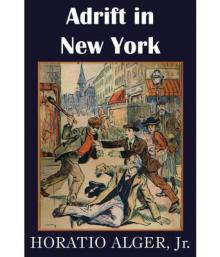 Adrift in New York: Tom and Florence Braving the World
Adrift in New York: Tom and Florence Braving the World Do and Dare — a Brave Boy's Fight for Fortune
Do and Dare — a Brave Boy's Fight for Fortune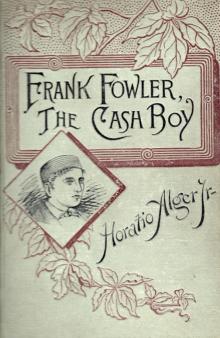 The Cash Boy
The Cash Boy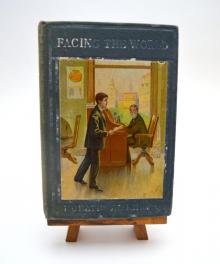 Facing the World
Facing the World The Young Explorer; Or, Claiming His Fortune
The Young Explorer; Or, Claiming His Fortune The Store Boy
The Store Boy Frank's Campaign; Or, The Farm and the Camp
Frank's Campaign; Or, The Farm and the Camp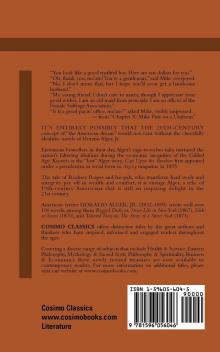 Cast Upon the Breakers
Cast Upon the Breakers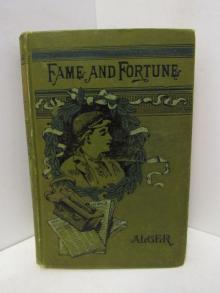 Fame and Fortune; or, The Progress of Richard Hunter
Fame and Fortune; or, The Progress of Richard Hunter The Errand Boy; Or, How Phil Brent Won Success
The Errand Boy; Or, How Phil Brent Won Success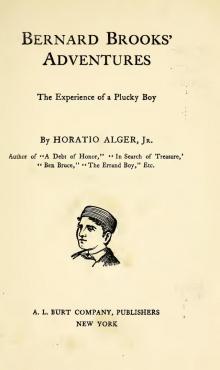 Bernard Brooks' Adventures: The Experience of a Plucky Boy
Bernard Brooks' Adventures: The Experience of a Plucky Boy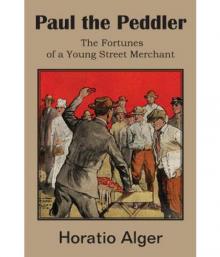 Paul the Peddler; Or, The Fortunes of a Young Street Merchant
Paul the Peddler; Or, The Fortunes of a Young Street Merchant Brave and Bold; Or, The Fortunes of Robert Rushton
Brave and Bold; Or, The Fortunes of Robert Rushton Try and Trust; Or, Abner Holden's Bound Boy
Try and Trust; Or, Abner Holden's Bound Boy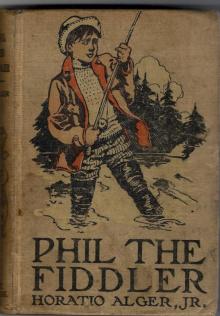 Phil, the Fiddler
Phil, the Fiddler In A New World; or, Among The Gold Fields Of Australia
In A New World; or, Among The Gold Fields Of Australia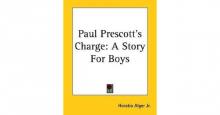 Paul Prescott's Charge
Paul Prescott's Charge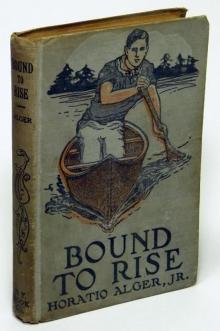 Joe's Luck; Or, Always Wide Awake
Joe's Luck; Or, Always Wide Awake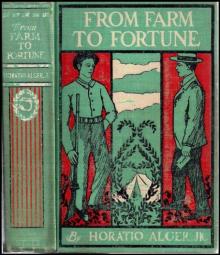 From Farm to Fortune; or, Nat Nason's Strange Experience
From Farm to Fortune; or, Nat Nason's Strange Experience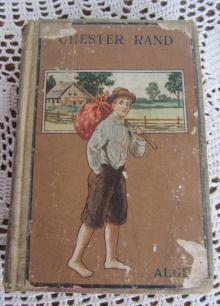 Chester Rand; or, The New Path to Fortune
Chester Rand; or, The New Path to Fortune Driven from Home; Or, Carl Crawford's Experience
Driven from Home; Or, Carl Crawford's Experience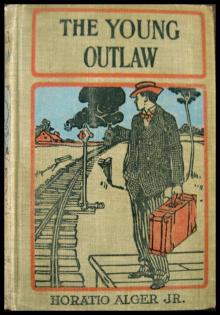 The Young Outlaw; or, Adrift in the Streets
The Young Outlaw; or, Adrift in the Streets Risen from the Ranks; Or, Harry Walton's Success
Risen from the Ranks; Or, Harry Walton's Success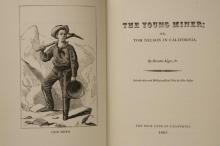 The Young Miner; Or, Tom Nelson in California
The Young Miner; Or, Tom Nelson in California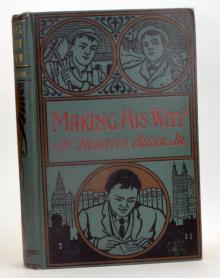 Making His Way; Or, Frank Courtney's Struggle Upward
Making His Way; Or, Frank Courtney's Struggle Upward Ben, the Luggage Boy; Or, Among the Wharves
Ben, the Luggage Boy; Or, Among the Wharves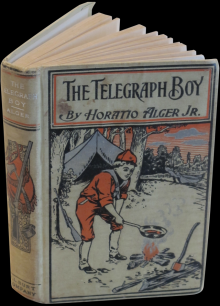 The Telegraph Boy
The Telegraph Boy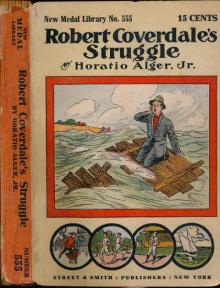 Robert Coverdale's Struggle; Or, on the Wave of Success
Robert Coverdale's Struggle; Or, on the Wave of Success Rufus and Rose; Or, The Fortunes of Rough and Ready
Rufus and Rose; Or, The Fortunes of Rough and Ready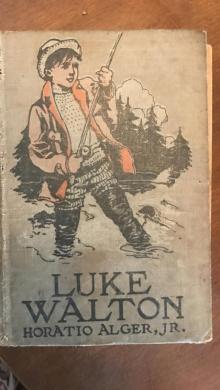 Luke Walton
Luke Walton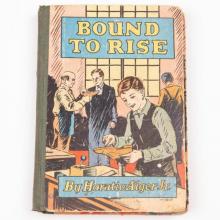 Mark Mason's Victory: The Trials and Triumphs of a Telegraph Boy
Mark Mason's Victory: The Trials and Triumphs of a Telegraph Boy The Young Musician; Or, Fighting His Way
The Young Musician; Or, Fighting His Way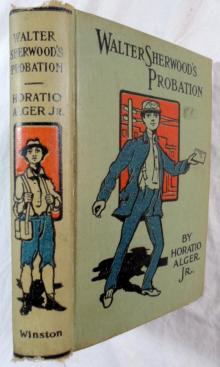 Walter Sherwood's Probation
Walter Sherwood's Probation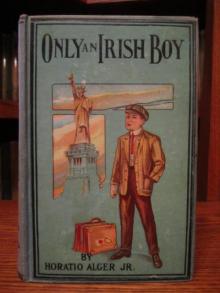 Only an Irish Boy; Or, Andy Burke's Fortunes
Only an Irish Boy; Or, Andy Burke's Fortunes Slow and Sure: The Story of Paul Hoffman the Young Street-Merchant
Slow and Sure: The Story of Paul Hoffman the Young Street-Merchant Herbert Carter's Legacy; Or, the Inventor's Son
Herbert Carter's Legacy; Or, the Inventor's Son Young Captain Jack; Or, The Son of a Soldier
Young Captain Jack; Or, The Son of a Soldier Timothy Crump's Ward: A Story of American Life
Timothy Crump's Ward: A Story of American Life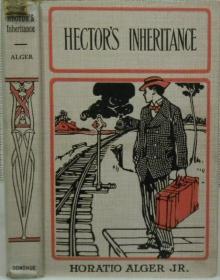 Hector's Inheritance, Or, the Boys of Smith Institute
Hector's Inheritance, Or, the Boys of Smith Institute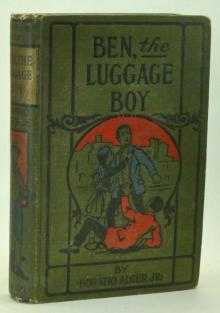 Ben's Nugget; Or, A Boy's Search For Fortune
Ben's Nugget; Or, A Boy's Search For Fortune